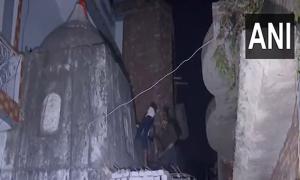It must be difficult for a director to live up to the hype built around him, especially if his last film has been commercially and critically acclaimed. His predicament is akin to a star batsman who with one great performan ce suddenly becomes the bastion of hope for the entire nation.
ce suddenly becomes the bastion of hope for the entire nation.
More often than not, after making an impression with a 'different' film, talented directors have succumbed to market pressures and conveniently embraced time-tested formulae.
Fortunately, Madhur Bhandarkar doesn't fall prey to this temptation and sticks to his guns with Satta.
In fact, he goes a step ahead and takes a radical break from the Bollywood ethos. His Mumtaz in Chandni Bar was a remarkable heroine. But we have seen several versions of this unfortunate woman on screen before Chandni Bar.
Anuradha Saigal (Raveena Tandon), on the other hand, is a heroine never seen before in Hindi cinema. She breaks every stereotype set by our filmmakers for female protagonists. The most important one being that at no point does she depend on a man for her survival.
Unlike several so-called female oriented films where the dashing hero has to finally become the heroine's knight in shining armour (the Dushman kind of pseudo-feminism), Anuradha conducts all her relationships with the men in her life on her own terms.
Nor is she like the typical opportunist politician (another filmi prototype) who peddles herself to make a career -- even a filmmaker of Gulzar's maturity couldn't steer clear of this cliché in Hu Tu Tu. In fact, it is a little surprising that a woman of her sensibilities falls for a budding politician and philanderer Vivek Chauhan (Samir Dharmadhikari).
Only after her grand wedding to senior politician Mahendra Chauhan's (Shri Vallabh Vyas) son, Anuradha realises she has made a mistake when she finds she is expected to play the part of an efficient doormat, like her mother-in-law. But Anuradha has other plans and promptly puts her arrogant husband in place.
In a scene obviously inspired by the Jessica Lal murder, a drunk and enraged Vivek pulls out a gun at a bar hostess who refuses to give him a drink and shoots her.
Unfortunately, while he is trying to flee the scene, he falls straight into the hands of an upright cop who remands him to police custody. With elections round the corner, Mahendra Chauhan's political future is in jeopardy till someone suggests that Anuradha should contest the election instead of her incarcerated husband (a la Rabri Devi).
Anuradha accepts this challenge, but not merely to protect her father-in-law's political interests. Under the tutelage of the party's intellectual guru Yeshwant Vardhe (Atul Kulkarni), she gradually finds her own identity and starts getting a hang of the game of power.
Bhandarkar's heroine is very different from the politically ambitious Aarti from Gulzar's Aandhi or Rambhi Devi in Vinay Shukla's Godmother. It is heartening to note that she doesn't lose her inherent values in the corrupt milieu she inhabits.
In a way, these very qualities also make her less realistic. It is highly unlikely that a woman like Anuradha would be able to not just survive, but also grow in the Indian political system.
But hey, haven't we always worshipped the goody-goody heroes in our films? For once, let's raise a toast to a larger-than-life heroine.
Bhandarkar has written the film very well and barring the last 20 minutes, which seem a little contrived (or too idealistic, perhaps), Satta keeps a firm grip on the audience. Luckily, there are no boring songs to break the momentum. The three songs of the film have been used sensibly. Asha Bhosle's Gungunati hai is a pleasant melody from music director Raju Singh.
The lighting looks strange in places -- the party high command's office is lit like the terrorist hideout in Mission Kashmir. The camerawork too is jerky at times. However, in a film like Satta, technical lacunae are largely irrelevant because the story is strong enough to offset such glitches.
Also, the performances from all the lead actors compensate for the few inadequacies in the screenplay (the spoof on film financiers, ad filmmakers and muscle-flexing heroes is quite foolish). The supporting cast of Govind Namdeo, Shri Vallabh Vyas and Manoj Joshi bring all their talent and experience into play.
Samir Dharmadhikari can boast he made his debut in a good film. But given the fact that his is a very flat character, there is very little scope for histrionics. He does a fairly efficient job of essaying the unscrupulous rich brat.
Atul Kulkarni has an aura of calmness about him that suits his character perfectly. It is easy to understand why Anuradha takes a liking to this man. His is a brilliantly subtle character and a lesser actor couldn't have carried it off.
Raveena Tandon has obviously landed the role of a lifetime and she makes the most of it. She portrays the firebrand Anuradha with the kind of passion you wouldn't have expected from the heroine who once danced to the tune of Tu cheez badi hai mast. One can't remember the last time we saw such a genuinely modern woman on screen.
The person who deserves most of the credit for making a film like Satta is the director who dared to tell a story like this within the framework of commercial Hindi cinema.
Madhur Bhandarkar, may the force be with you.








More from rediff